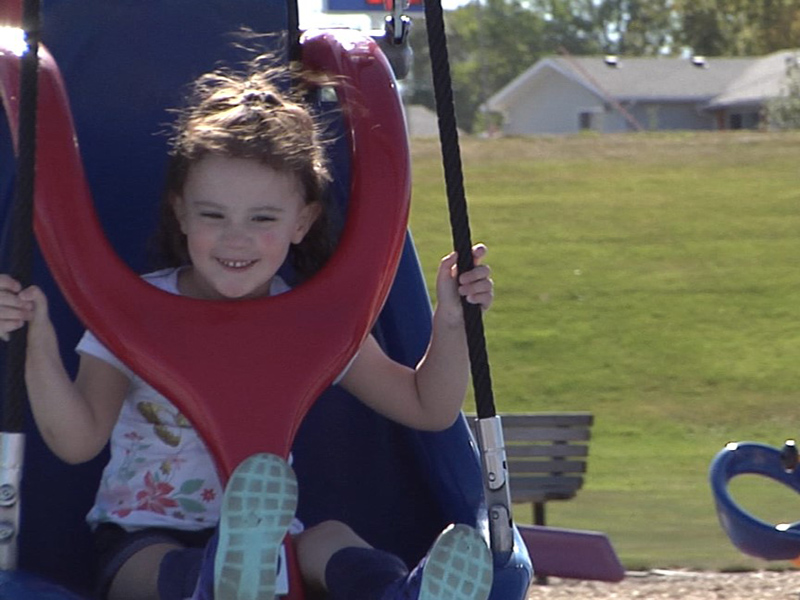Like any little girl at a playground, Harleigh Long loves to swing. But when she’s not flying through the air, she’s using her walker to get around.
Harleigh has a rare choromosomal disorder in which her body has lower muscle tone than typical children her age.
Developing slowly
“We first started really noticing when she wasn’t sitting up at a normal age. It took until she was about 10 months old for her to be able to actually sit up unassisted. And so that was really strange to us, and that’s when we kind of started seeing the therapist at Sanford,” said Riley Long, Harleigh’s mother.
“We’ve been seeing her for about a year and a half,” said Brittany Wilhelm, a pediatric occupational therapist with Sanford Health in Bismarck. “She’s 3 (years old) right now, but at that time she was not walking, doing a little bit of crawling, but delayed. Basically she was demonstrating hypotonia which is a kind of lower muscle tone, and then just generalized weakness, so causing some developmental delays.”
Showing progress
With help from therapists like Wilhelm, Harleigh is now able to move independently in her walker. She has been fitted with braces to help keep her ankles in line and to keep her knees from hyperextending. And her therapy is helping her slowly but surely reach her developmental milestones.
“She is bubbly. She’s a little spitfire. She loves to kind of lead the session. She’ll tell you what she wants to do,” said Wilhelm. “She’s awesome.”
“Oh my gosh, she loves going to therapy,” said Riley Long. “She gets so excited to go see her therapists. They do a lot of fun stuff. They work with her muscles, with her hands, so many different things in her speech. She’s come such a long way.”
“You can see that her confidence is boosted, which helps her jump and climb onto more challenging obstacles or pieces of playground equipment,” said Harleigh’s father, Brandon Long. “Or even just at home trying to traverse the stairs.”
Fortunately, Harleigh’s condition is non-progressive, meaning her muscles should not deteriorate any further as she grows. She should continue to develop with the help of her Sanford Health therapists, which in turn, should allow her to truly soar. Especially at the playground.
Learn more
- Physical therapy helps young children reach milestones
- Diagnosing, managing a child’s developmental disabilities
- Patient with cerebral palsy grows up with Sanford Children’s
…
Posted In Bismarck, Children's, Rehabilitation & Therapy

